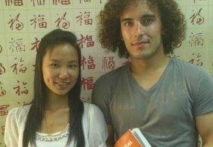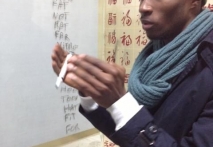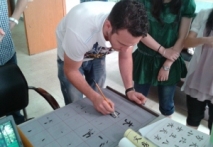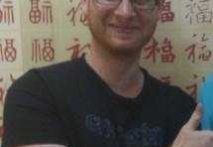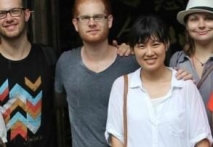Latest News
- Wuxi's Nanchang Street--a historic cultural district that combines classical charm, delicious food, and fun activities
- chinese study
- lastest courses
- Business Assistance/International Consortium of Stem Cell Research
- Foreigner's view of Jiangsu -Changzhou Jintan starts
- estimonials for Our new French Internship student Anais 企业表扬信
- The Double Seventh Festival in China Introduction
- Chinese Proficiency Test (HSK)
- China University Mining and Technology
- Wuxi Library
Students Say
Mandarin Student Zack
Mandarin Education School is a great place to learn Chinese and Chinese Culture.I've learned a lot in this school, my Chine...
Learn Chinese Travel China
If you want to learn Chinese and also discover China, Mandarin Education organize the most funny and cultural study tour.
The...
suzhou Mandarin Jude
I am Jude, I am learning Mandarin in Suzhou Mandarin School,I was learning in Wuxi Mandarin Education too.I like my Chinse Teacher...
chinese class
Improve your reading, speaking and your writing by experiencing our teaching methods,Offer free student Visa.
...
Wuxi Mandarin Jessie
I've learned Chinese for almost 8 years, I can understand what Chinese people say,but when I speak, I feel very uncomfor...
Chinese Internship or Jobs
You are looking for a professional experience abroad? Get the opportunity to discover the Chinese business,Look for an ...
Mandarinedu Student Florent
I love my Wuxi Mandarin Education School. It is the EASY MANDARIN Learning way, I am learning faster than I wanted.My teach...
Mandarin E Learning
Mandarin Education School offers you Online Chinese Courses. It has never been so easier to have Chinese courses ...
Mandarin Student Brad
I am studying Chinese in Mandarin Education School. I can speak quit good Chinese and talk to Chinese people by myself. Thank...
Wuxi Mandarin edu. Student Jennifer
I love learning Chinese in Mandarin Education School.That's a great place to learn and make friends.
...
Add Our School Official
to get more informations

0086 1866 1199 988
0086 510-81151808
Sandy.Swun
519988808
Mandarin Education School
Room 405, 4 Fl,Building No.8,
Maoye Business Center,
Chang jiang No.1,
New district , Wuxi City , China

By Em Casalena
hink of a time where you were really grateful for something.
Did a beloved friend give you a really heartfelt gift?
Has a coworker covered your shift on a Saturday?
Chances are you can definitely think of a time where you needed to express how thankful you were for something.
For native English speakers, it’s pretty easy to express gratitude. A simple “thank you!” is often enough to show other people that we’re thankful.
But if you’re learning Chinese, you might be a bit overwhelmed by the many ways native Mandarin speakers can express gratitude beyond bowing or the basic 谢谢 (xiè xiè) — Thank you.
Don’t worry. We’re here to help.
We’ll show you six useful words and phrases to say “thank you” in Chinese, depending on your audience and the situation.
We hope it’s helpful enough to earn your heartfelt thanks!
Why Should I Learn More Than Just 谢谢 (Xiè Xiè)?
谢谢 (xiè xiè — Thank you) is definitely the default for saying thank you in Chinese, but it isn’t appropriate for every situation.
In your native language, you wouldn’t throw a passive “thanks” to your business partner if they gave you an incredibly kind gift, and you probably wouldn’t exaggerate thankfulness when someone passes you the salt at dinner.
See what I mean? Thankfulness is a simple concept, but there are many different ways to express it for different situations. No matter the language.
Plus, learning these new phrases is a great way to add to your vocabulary as well as your cultural knowledge. When you know more than just 谢谢, you’re taking an invaluable step towards Mandarin Chinese fluency!
6 Classy Ways to Say Thank You in Chinese for Any Situation
More often than not, a native Mandarin speaker will realize you’re unaware of certain language quirks and will be understanding if you don’t say the exact proper thing. But what’s the point of diving into a language if you aren’t willing to master fluency in all its forms?
Of course, it can be tricky to master the nuances of Mandarin if you’re not actively living in China. But with innovative language learning tools like FluentU, you can hear these phrases in the context of authentic Chinese conversations—making them much more relevant and memorable for your own use.
With FluentU, you get real-world Chinese videos like movie trailers, YouTube clips, news reports and more. Each video comes with interactive captions you can click for an instant definition of any unfamiliar word, plus other videos where the word is used.
There are a number of videos where you can hear “thank you” expressions used in different settings, among many other vocabulary and grammar concepts.
The Basic 谢谢! (xiè xiè!) — Thank You! and Its Variations
When in doubt, use 谢谢 (xiè xiè) — Thank you. This is the default, basic way of saying “thank you” in passing, when you’re accepting gifts or every other casual encounter in between.
Variations of this barebones phrase include 多谢 (duō xiè) — thanks a lot, which is used in SMS messages and notes as opposed to writing or typing 谢谢. It’s appropriate for casual spoken conversations as well, like when you’re handed something at work.
感谢! (gǎn xiè!) — Many thanks! or 非常感谢你! (fēi cháng gǎn xiè nǐ!) — Thank you very much! can be used for extreme situations where you owe someone serious gratitude. This variation is appropriate for many semi-formal interactions.
For example, if a classmate helps you out with a big part of a school project or a coworker covers you at work unexpectedly, then 感谢! or 非常感谢你! are appropriate phrases to use.
哪里哪里! (nǎ li nǎ li!) — You’re flattering me!
This is a rather cute expression similar to saying “oh stop!” flirtatiously in English.
哪里哪里! (nǎ li nǎ li!) — You’re flattering me! can be used for different non-romantic kinds of situations as well.
This phrase roughly translates to “you flatter me” or “you’re too kind” and is used when receiving a compliment. Humbleness is a big part of Chinese social culture. Whether you’ve received a flirtatious compliment from someone you’re crushing on or you’re being praised by your boss for your hard work recently, 哪里哪里 is an apt response.
麻烦你了! (má fan nǐ le!) — Sorry for the trouble!
麻烦你了! (má fan nǐ le!) literally translates to “inconvenience to you.” But this phrase sounds very self-deprecating in English, so “sorry for the trouble” is a more practical translation. It’s a great phrase to use when someone else has gone out of their way to help or work for you.
Note that it isn’t quite a formal apology. Even if someone has done a favor for you that you didn’t ask for or if the work they’ve done for you wasn’t terribly inconvenient for them, 麻烦你了 is an appropriate way of saying “thank you” with a bit more gusto.
This phrase is common in office or business culture.
不,不! (bù, bù!) — No, no!
Deflecting compliments is common in Mandarin Chinese, no matter your gender or the compliment that was given. It isn’t a self-deprecating practice, either. Actively behaving humbly is important in many Chinese-speaking cultures and makes one look very likable.
When you think about it, it’s also pretty common in many English-speaking cultures as well, particularly with older generations. But if a young Westerner receives a compliment, they typically respond with “aw, thanks.” Not in Chinese culture!
Simply waving your hands and saying “no way” is a good way to deflect a compliment and come off as humble, modest and admirable. We both know you deserved that compliment, but deflecting it just makes you look better.
你太好啦! (nǐ tài hǎo la!) — You’re the best!
你太好啦! (nǐ tài hǎo la!) — You’re the best! is a great expression to use between family, friends or people you know really well in a work or school environment. This phrase properly expresses thankfulness while lifting up someone you care about at the same time!
Of course, you can expect a feverish response somewhere along the lines of 不,不! (bù, bù!) — no, no!
Even if your Mandarin-speaking friend deflects the gesture entirely, rest assured that you expressed your thankfulness in a way that made them feel pretty great about themselves.
你太好啦 probably shouldn’t be used in a formal situation with someone you don’t know super well or your boss. Keep it between you and your buds.
谢谢大家… (xiè xiè dà jiā…) — Thank you all…
When addressing a group at a formal banquet for a toast, a business meeting, a wedding or some other large group setting that’s formal in nature, 谢谢大家… (xiè xiè dà jiā…) — Thank you all… should be used as the first part of the phrase.
The second part of this phrase should be specific. You could add:
…的关注。(…de ɡuān zhù.) — …for paying attention.
…的来临。(…de lái lín.) — …for coming here.
For example:
谢谢大家的关注。(xiè xiè dà jiā de ɡuān zhù.) — Thank you all for paying attention.
谢谢大家的来临。(xiè xiè dà jiā de lái lín.) — Thank you all for coming here.
It’s important to make the differentiation between thanking one person and a large group. It’s also important to state what you’re thanking the large group for in a formal situation. Not too complicated, right?
